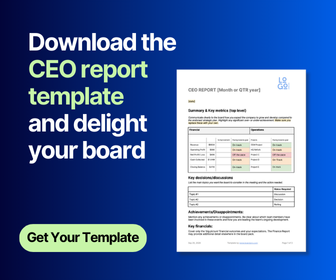Board information requirements: How to get the best from your management team
Needless to say, a lot goes on during Board meetings – strategic issues and topics are brought up, agendas are consistently referenced, a handful of decisions need to be made, and risks and opportunities are to be weighed out and assessed.
All this happens during a relatively short amount of time compared to the days and hours needed to process and compile all this data and information. And often, senior management is not given the required amount of consideration regarding information and expectation load. Senior managers have a heavy workload as well. Being a valuable contributor to a Board means spending hours preparing. Compiling papers, attending meetings, making strategy proposals and preparing presentations are simply a few of the many tasks that directors are faced with.
In this blog, we explore advice and insight on what Boards can do to satisfy their information requirements whilst being mindful to not overburden their management team:
The importance of relevant information
Non-executive directors need to bear in mind that management handles the operational tasks of the operations. Therefore, they naturally have more time available to them in regard to operational figures and information. Management must make sure to handle and use the information available to them correctly. They must:
- Disclose all relevant information for the betterment of the Board. They should not keep information to themselves because of its impact on members of staff or themselves.
- Make sure not to use the information to control or manipulate the Board, such as providing selective or wrong information with the intent to misguide.
- Keep integrity throughout the meeting, with the best intention of the organisation and other members of the Board.
- Use straightforward and not overly technical language to facilitate the accessibility of all members of the Board.
All information presented during meetings should pass the “reasonably intelligent person” test of comprehension.
The Board must ensure that it has all required information from management to perform effectively, whilst management must comply by providing all necessary relevant information so that directors can do their jobs properly. Directors must be familiar with the company’s mission, vision, values and business drivers. They must understand the company’s external market and internal environment, including being able to assess all opportunities and risks. All that can only be done if the CEO and senior management provide all appropriate information to the directors about what they are doing and the performance of the company.
That said, however, the management/CEO report cannot be a duplicate of the Board papers, and the Board’s information needs will naturally differ from that of management. It isn't up to the Board to deal with any of the operations. It is the duty of the CEO and senior management to ensure that Board meetings do not focus on operational matters. Therefore, any papers put to the Board should only include the most important information and key matters of substance, not operational details. Board meetings and management meetings are both necessary but should not take place at the same time.
When a person agrees to become a contributing director of a Board, it becomes their statutory obligation to do right by the company that they represent. This means keeping objective and reliable, acting for the betterment of the organisation. To do so, they need to keep themselves informed about any subject matter in relation to decisions to be made. In order for a decision to go through, all directors need to have a unanimous vote. Their decision cannot be complied with unless the directors have all relevant material to base their decisions on. Getting the views from a wider perspective (including views from the external market) ensures saturation of information that will increase the likelihood of the Board making the correct decision for the organisation.
It is highly recommended that the Board includes an extra step into their procedure. One that enables all directors to receive a list of all decisions to be made and all relevant information that is needed to support that decision. With that said, prior preparation and notice should also be given to the directors. Late papers can cause improper decisions to be made, with a lack of understanding of future implications. Directors need to comply with their statutory duties. Therefore, they should be given enough time to assess and understand what they are deciding upon.
A Board can control the information it receives. If there had been an information overload, it could have been prevented. If there was a huge amount of information, then more time may need to be taken to read and understand it. The complexity and volume of information cannot be an excuse for failing to properly read and understand the financial statements. It may be for less significant documents but not for financial statements. Justice Middleton in the Centro judgment (ASIC v Healey [2011], etc. FCA 717 at 226):
Tips for writers of Board documents
To keep too practical, documentation should be kept concise. Many directors are busy, and their job on the Board needs to be kept straightforward. Providing documentation in this way makes the directors’ lives easier. Generally, the writers of Board papers are so familiar with their subject matter that they forget that others around them do not share similar knowledge with them exactly. Writers need to keep in mind to write in simple, non-jargon terms. They must understand that directors have expertise in some things that they do not have themselves and vice versa. Papers should not include abbreviations that are not explained, technical jargon, indecipherable financial information, or graphs that are not summarised.
Documentation should be formatted with the following kept in mind:
- Instead of lengthy paragraphs, bullet points should be used.
- Lengthy documents should be cut into several parts:
- Executive summary
- Table of contents
- Page number
- Sectioning
- Glossary
- Key points, options and recommendations are to be highlighted and brought to the directors’ responsibility attention.
- Complex terms to be explained clearly
- Be written with clarity
- Void of spelling errors, grammatical faults, rambling, etc.
- Include all information - despite good or bad - and provide equal explanation time to both.
Here is an example of a 'best practise' board strategic agenda template and board pack
Board paper selection
Different Board meetings will require different papers. Therefore, the choice of papers will be dictated by Board’s responsibilities and how much time is available. In deciding, the Board calendar should also be considered, such as statutory reports, performance reviews, and auditing, among a few. This is a decision to be made by the Chair, the CEO and the company secretary, all working together. In making the decision, they need to consider the director’s request or a need identified prior to the meeting.
Papers have different requirements and categorisation, such as “for approval”, “for discussion”, or “for noting”, therefore before deciding who to assign the paper to the prerequisite, the nature of the paper should be considered. The paper selection should be based on a few prerequisites as follows:
- How urgent the issue of discussion is;
- The implication of the issue of discussion for the organisation;
- If the matter is reserved for decision by the Board in accordance with policy;
- The novelty of the issue;
- How much more information can be acquired regarding the issue to facilitate better decision-making;
- The scope of the task and how much time is available;
- The requirement of resources;
- The capacity to complete the task fully.
Conclusion
It is the Board’s job to be objective and reliable, acting with the best intention of the organisation that they represent. Board papers that are received in a timely manner allow directors to properly familiarise themselves with the matters at hand. The correct questions can be asked and discussed at meetings. A Board needs to have all relevant information so that they have the ability to challenge and scrutinise the inner workings of the organisation and make the best strategically relevant decisions that can affect the future of management. Proper, well organisation information provided in Board papers build a stronger trust between the Board and management. It shows unity and collaboration between the two for the eventual betterment of the company.
Share this
You May Also Like
These Related Stories

Strategic Management – The Role of Board Directors

Board software: how to choose the right one
.png)

